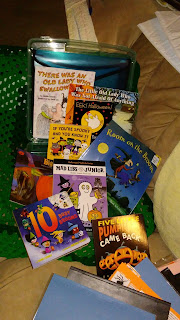Thematic Programming - The Good and the Not So Good
 |
| My October box contents |
There was a comment on one of my media feeds asking music therapists if they ever used themes when planning sessions. Lots of us have responded, stating that we do indeed use themes when planning music therapy clinical interactions. This seemed to be a completely new idea for the original poster, and I find that pretty fascinating.
Let me just say, from the beginning of this post, that I do both thematic and non-thematic programming for my music therapy clients. In the past several months, my reliance on thematic programming has drastically decreased, but that is because most of the music therapy work that is happening is being supervised by me and not led by me. When I was acting as therapist rather than intern supervisor, I relied quite a bit on structure and themes played a large part of that structure.
As with most music therapy ideas, there are benefits and drawbacks to becoming someone who uses themes as part of music therapy interaction. Let's start with the benefits (as I see them - let me know if there are more that you see - this is NOT a complete list, by far!!).
- Organization: It is easy to organize based on themes. I have folders that have theme headings - Zoo, Belly Breathing, Instrument Families. If materials fit within those file folders, then I include the materials within that folder. If the materials do not fit, I make a list of the materials that I need for each therapeutic music experience that is part of the theme, and I keep that in the file folder. When it is time to pull out the February box, I have lists and materials that go with February themes. Bam! It's all right there!!
- Continuity: When I was following my own self-imposed themes, I had most of my session planning accomplished. Week one - instrument exploration, week two - centers focusing on sensory exploration, week three - coping skill development, week four - Musician of the Month reveal. I knew my focus and I knew what to develop each time. I'm not sure that many of my clients or fellow staff members even really figured out my system, but they did know when it was time for the Musician of the Month reveal.
- Common Focus: I work in a facility where music therapy is considered "educational enrichment." Translation? Music therapy group services are offered to all students and are NOT based on IEP goals. This offers me lots of freedom in my session planning. Themes offered me a way to provide music-based education to my clients based on specific topics. I know that everyone at my facility in a particular month experienced the violins because everyone had time to explore that instrument during week one in February. If I need to see specific reactions, all I have to do is look back to that week and see the documentation that I do after every session.
- Session Format Consistency: With themes, you can shape your session around specific patterns and therapeutic music experiences. Opening song, reading/singing the book of the theme, singing a related song to the book, instrument use during word recognition therapeutic music experience, fill-in-the-blank songwriting experience, movement experience, and then closing song - fill in the specific theme materials, and voila! Session planning/strategizing complete!!
- Scripting: There is a danger that a therapist will be so focused on finishing all the therapeutic music experiences that are included in the theme that he/she will not see client responses and reactions and accommodate those as appropriate. I call this "therapeutic scripting." If my clients walk in, yelling and screaming at each other, then my "Birth of a Seed Ballet" may not be the best idea, even if it is on my theme plans! In my opinion, a good therapist can break away from the theme (or stretch it a bit) to shape the musical intervention around the client in that moment. Sometimes themes become the entire script.
- Accumulation of Stuff: I have a closet that I dedicate to my music therapy materials. In that closet, I have 12 boxes - one for each month of the year. I put all my monthly themed materials into those boxes, and they are rapidly filling up! When I find an inexpensive Thanksgiving book, I purchase it, write a therapeutic music experience about it, and then put it in the November box. I find it a bit more difficult to walk away from those purchases now than I did before. This is where Teachers Pay Teachers is EXTREMELY dangerous - you can find so many things to go with all sorts of themes. Beware! Beware!! (But go to MY store, of course!! And, buy something!!!)
- Patterns: This is both a benefit and a drawback (see Session planning continuity section above). Some clients really like knowing what is coming up in therapy. They enjoy knowing that there will be some Santa Bingo songs during the month of December. Others do not want to do the same thing twice. (Therapists can be like that as well!) Some clients do not handle changes in patterns easily, so starting off with a pattern can lead to behavioral issues later on if the pattern has to change or adapt.
- Obsession with Themes: If you are not careful, you can fall into the idea of themes and never come back up for air! You look at everything with an eye for themes. New book? What theme can this fit into? New scarves? How can I use these in my theme sessions? This is where I fall. I think about themes for therapy all the time!


Comments
Post a Comment